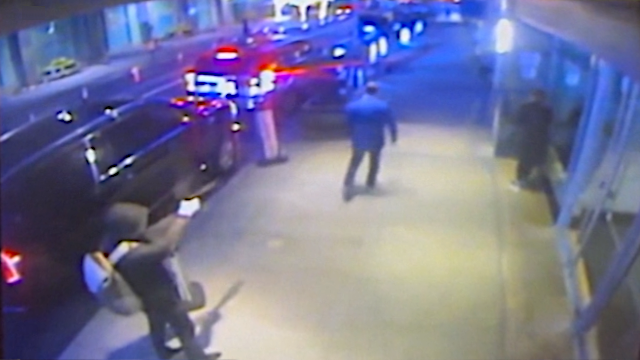Charlie Kirk, Terrorism and Curbing Political Violence
Charlie Kirk, Terrorism and Curbing Political Violence
Undermining the popularity of politically-motivated domestic terrorism starts by calling it what it is.
(Charlie Kirk speaking at Utah Valley University before his assassination. | SOURCE: Tess Crowley / The Deseret News)
The United States has endured two public attacks in just under a week, both of which have sent shockwaves through American society and culture, especially the brutal assassination of commentator Charlie Kirk three days ago.
Despite the tragic loss of life and disturbing nature of each and every killing like this, there is a deeper danger in politically motivated, terroristic violence: the power and invulnerability of the message it spreads. To counter this threat, Americans dedicated to preserving life, ending political violence and exposing the vile perpetrators of these crimes must call them what they are: terrorists.
The term “terrorist” is often criticized by scholars for, as one put it, being “a pejorative term that delegitimises whoever it is attached to.” But that is precisely what warrants its use in this context.
For those who seek to preserve human life from unnecessary political violence — both the violence itself and the ensuing tensions — avoiding euphemisms and tepid language is paramount. Using such language implicitly condones political violence, something we must avoid at all costs.
The “othering” performed by the term “terrorist,” in this context only, serves a few critical, positive purposes. It renders socially unacceptable any support to such an individual’s actions, delegitimizing not only the perpetrator but, more importantly, the idea of political violence. Secondly, it separates that individual and their actions from any groups or ideologies they may have been associated with, potentially reducing tensions.
A worrying number of average Americans accept political violence. An Emerson College poll found that 41 percent of registered voters aged 18 to 29 years, and 17 percent of the total American voter base, thought the 2024 assassination of United Healthcare CEO Brian Thompson was “acceptable” or “somewhat acceptable.”
(Luigi Mangione, left, allegedly prepares to senselessly assassinate Brian Thompson, right, in New York City, on December 4, 2024. | SOURCE: Wikimedia Commons)
This popularity is due in large part to what Thompson represented: a healthcare system that many Americans believe is broken, and an insurance industry whose business decisions can mean the difference between life and death for many Americans.
Yet murder, for its own sake, is obviously not popular. Finding polling on what percentage of Americans support murder in general is impossible, as the concept of supporting random, senseless killing is antithetical to the basic instinct of self-preservation.
We can gain context through inference, though. Over 40 percent of Americans believe that the death penalty (with the insinuation of a long, fair legal process preceding its application) is wrong, even against someone who has committed murder. How many steps removed from a fairly imposed death penalty is the extrajudicial, brutal murder of a non-criminal?
Many Americans would say “a lot of steps.” Last month, 23-year-old Iryna Zarutska, a Ukrainian immigrant to the United States, was brutally and randomly killed on a Charlotte Area Transit System train. The stabbing, which reached mainstream attention earlier this week, led to a bipartisan surge in calls for reducing crime, especially given the perpetrator’s extensive criminal history.
Yet, it should worry everyone that politically motivated killings often receive less universal backlash, and even support, in contrast to random murders.
We must, and can, address this problem. Calling the perpetrators of these acts “terrorists,” and their actions “terror,” will force “many to verbally negotiate and assert who they are, who they are allied with, and who they are against,” as Michael Bhatia described.
Public support normalizes and fuels this worryingly common strand of domestic terrorism. Making political violence culturally unacceptable deprives such fanatics of the martyrdom that so many of them desire, something that should be reserved for their victims.
Just as it is easier to say mean things online to “User 124,” some unknown, nebulous entity, than it would be to say it to that person’s face, it is easier to support the vague conception of the death of someone you dislike than to condone the deranged actions of a known terrorist. How many American academics or public officials support, for instance, the Islamic State and its actions? I would guess many fewer than have publicly condoned Charlie Kirk’s assassination.
Terrorism expert Michael Bhatia gave that description when discussing the George W. Bush administration’s expansive, cudgel-like use of the word “terror” during its War on Terror — and arguably lost his life from the overzealous pursuit of the end of terrorism. Yet, there are not the domestic tradeoffs to calling a spade a spade, being unafraid to label a terrorist attack what it is, that there are internationally.
Modern discussions about American foreign policy have bastardized the term “terrorism,” but this proposal would not continue that trend. The only reasonable applications of the term would be toward, as Israeli terrorism expert Boaz Ganor succinctly described, “the intentional use of, or threat to use, violence against civilians or against civilian targets, in order to attain political aims.” This definition would include attacks on any major American political figure but exclude even the brutal, yet apolitical, murder of Iryna Zarutska — and yes, President Donald Trump always has been, and always will be, a civilian.
It is relatively easy for the average American to tell when an attack is politically motivated. This was demonstrated by the widespread backlash following now-former MSNBC contributor Matthew Dowd’s ridiculous suggestion regarding Charlie Kirk’s assassination that “we don't know if this was a supporter shooting their gun off in celebration.”
Additionally, the pervasive use of “terrorist” to describe perpetrators of political assassinations could even serve to lower the temperature of the partisan divide. After multiple Minnesota lawmakers were brutally slaughtered, the now-common blame game over the political identity and views of the shooter quickly began — involving the United States’s richest man and a sitting U.S. senator, to name a few.
(Vance Boelter, the suspect in the brutal, terrorist killings and attempted killings of Minnesota lawmakers and their families, is taken into custody. | SOURCE: Ramsey County Sheriff's Office / CNN)
However, the “othering” effect of the word “terrorist” sets a perpetrator of such heinous crimes apart from average Americans who may otherwise share that person’s worldview. It makes gross overgeneralizations like “The Left is the party of murder,” which Elon Musk posted following Kirk’s assassination, seem all the more ridiculous.
No large swath of the American public regularly commits violence. If every American frustrated with the U.S. healthcare system went and killed someone working in it, we would quickly run out of healthcare workers. But there is a reason why Luigi Mangione is so individually famous.
Even inherently violent ideologies, like the hatred of Jews and Israel — probably the extremist ideology with the most support from American public officials and commentators — have not led their millions of adherents to effectuate their goals lethally. Nonetheless, we must swiftly condemn those who act out their hatred, be it violent anti-Jewish views or otherwise.
Most Americans realize that violence is not an acceptable answer to political differences, and those who do not are wrong under any standard. Even through the lens of moral relativism — exemplified by the phrase “one man’s terrorist is another man’s freedom fighter” — political violence is not justified in our country.
Unlike many places where terrorism is rampant, the U.S. has a government that, by and large, protects the rights of its citizenry, including a more robust freedom of speech than its European allies, undermining any justification for protesting with violence. Additionally, it has a functioning democratic process; tens of millions of Americans make their voices heard through the ballot, not the bullet — or, much to President Trump’s chagrin, the voting machine.
So, no, Matthew Dowd, this act of violence was not the understandable product of Kirk’s words. Still, the fact that so many people will justify, excuse or even support political violence convenient to their worldview is worrying, but unsurprising.
Our hyperpartisan moment has made politics an extreme zero-sum game: anything that benefits your team can be justified. When an act of political violence against a controversial figure occurs, it resonates with millions as a mere question: Does your political faction benefit from this person no longer being alive? In this way, people can skirt reflecting on what sick beliefs could bring about the killing, instead reveling in a world with fewer people opposed to their own values.
As long as these shooters, these terrorists, stay merely an idea, instead of a revolting, unavoidable reality, they retain a dangerous appeal, which must be stopped.
The best way to counter this acceptance of political violence in the abstract is to expose the terrorist’s specific beliefs. For every Ted Kaczynski, thoughtfully articulating his motives for his nonetheless depraved taking of human lives, there will be dozens of Dylann Roofs, whose extreme, incoherent ramblings confuse as much as they disgust. It is much harder to support the murderous lunacy of any given terrorist than the abstract idea of a world bereft of someone with whom you disagree, be they Charlie Kirk or Paul Pelosi.
There is a deeper good here than simply the goal of limiting terrorism. The idea of higher education, and any conception of the liberal arts curriculum, is succinctly summarized on Washington and Lee’s Coat of Arms: “Omnia Autem Probate: Test All Things.” This means that no one should just accept the label of “terrorist” being placed on anyone committing a political assassination. By exposing people, to the greatest degree possible, to the revolting views of individuals who commit these attacks, they will become more thoughtful opponents to terrorism and more willing to call terrorism what it is.
Whether by using a descriptor like “terrorist” or by forcing potential supporters to confront the distorted ideas they back, reinforcing in the minds of the public that murderous behavior is abnormal and wrong is beneficial all the same. Both options aim to make the average person less likely to publicly support any terrorist attacks, reducing the likelihood of the attacks themselves.
But just as the malicious ideas of domestic terrorists are nearly impossible to extinguish — with the internet and social media providing countless avenues for a fire to spread — the ideas of Charlie Kirk, and all those martyred for their beliefs, will persist. Long after the memory of his assassin is cast aside in the dustbin of history, exorcised from civil society, Kirk’s vision for a robust, civil American dialogue on the issues that divide us will endure, both at Washington and Lee and across our great land. May God rest his soul.
This piece has been adapted from Professor Seth Cantey’s POL 274: Terrorism.
The opinions expressed in this magazine are the authors’ own and do not reflect the official policy or position of The Spectator, or any students or other contributors associated with the magazine. It is the intention of The Spectator to promote student thought and civil discourse, and it is our hope to maintain that civility in all discussions.




